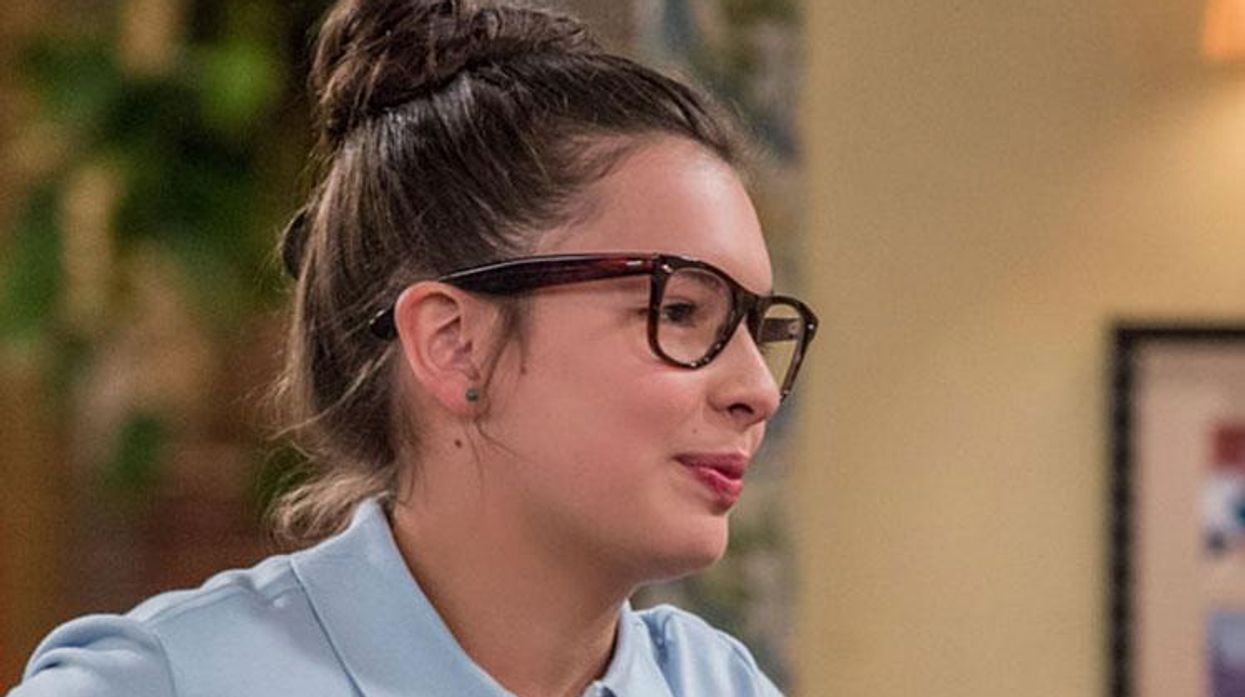Arts & Entertainment
Lesbian Latina Character Takes on New Meaning in Trump Era

Elena Alvarez, the teenager on Netflix's One Day at a Time, is one of the most refreshing queer characters on television.
February 09 2017 5:51 AM EST
yezyes
By continuing to use our site, you agree to our Privacy Policy and Terms of Use.

Elena Alvarez, the teenager on Netflix's One Day at a Time, is one of the most refreshing queer characters on television.
Isabella Gomez, who plays Elena Alvarez on Netflix's remake of the 1970s series One Day at a Time, felt intimidated at first about playing a lesbian character because she was worried she might not get it right.
Luckily, Gomez had a writers' room that included LGBT scripters, such as Michelle Badillo, who helped shape Elena's storyline, including her coming-out story, which was based on Badillo's experience. Though the show was filmed before the presidential election, Gomez says the political campaign definitely had a presence on set. "The whole cast and the writers' room were going back and forth, like who knows what this will mean later," she says.
Gomez plays a 15-year-old Cuban feminist, queer teenager who is headstrong and independent, often clashing with her family. The Netflix remake of the Norman Lear original focuses on a Cuban family living in the Echo Park neighborhood of Los Angeles.
As soon as the show premiered on Netflix January 6, queer women were buzzing online. In one episode, Elena's mother, Penelope (Justina Machado), makes an effort to connect with her newly out daughter by telling her that she spent some time reading Autostraddle, a queer women's website, where she found out how much Eleanor Roosevelt loved monocles. Elena jokes about her mother for using monocles to try to relate to her, but nevertheless Penelope has a tough time with accepting her daughter's revelation at first.
Penelope eventually comes around after talking to her mother, Lydia, played by Rita Moreno. Lydia admits that she had reservations because of her Catholic background, but ultimately her love for her granddaughter outweighs everything else. Schneider, their landlord (Todd Grinnell), advises Penelope to work on accepting her daughter by citing statistics on parents who don't accept their children. He even says that as a child, he wanted to be a tap dancer, but his parents mocked him, and so he developed a drinking problem.
An overwhelming number of women of all ages reached out to Gomez after they saw her character's coming-out story, she says. Women would tell her "Elena inspired a conversation within my family" and "She gave me the courage to be able to come out to my parents and friends," she recalls.
That the character's mother and grandmother had different reactions to her coming-out was important to Gomez because it depicted the complexity of the experience. "A lot of times in media [portrayals of] coming out, you see either one side of the spectrum, where they're like, 'Oh, we always knew, thank God you came out!" or you're OK with yourself, or 'You're leaving our house now; don't ever speak to us again!' and that's not always the case," she says. "As you see in the show, there's a range of reactions, and I think that's what makes it true."
The character is something of an anomaly on television. Last year Autostraddle looked into how many lesbian and bisexual women characters had been killed off in the history of television, and found 173. Queer women getting killed on television is such a regular occurence that it has become a trope, known as "bury your gays."
GLAAD's annual report on the state of LGBT media representation last year found that in 2016 alone, 25 lesbian and bisexual-identifying female characters were killed. And that is without breaking down those numbers further into race and ethnicity. GLAAD's report showed that around 72 percent of all LGBT characters on cable and streaming services are white. Out of the LGBT characters on TV, only 8 percent are Latino/a, while the U.S. Latino/a population is 17 percent of the whole.
With this gap in representation, Janet Quezada, a senior strategist for Spanish-language and Latino media at GLAAD, recognizes the importance of an lesbian Latina character like Elena on television. "It is so refreshing to see the inclusion of Elena, a Cuban-American queer young woman, on-screen because for so long the Latinx LGBTQ experience has been invisible or, if shown at all, reduced to shallow stereotypes," Quezada says.
"It's important for Latinx LGBTQ people to be seen in our full authenticity," she adds. "Without that visibility, the larger culture forgets we exist, and that has a lived impact through policies, legislation, and executive orders that impact us."
The show has taken on a new relevance because of Trump's Muslim ban and other potential anti-immigrant orders -- one episode deals with Elena's best friend, a teenager whose parents have been deported -- and the reports that he is considering signing a "religious freedom" order that would make it legal to discriminate against LGBT people, Gomez says. "We're glad that we put it out there and we had a voice," she says. She hopes the show comes back for another season, though it hasn't been confirmed yet.
Gomez says the intimidation set in when she realized the impact of her character's coming-out story. But ultimately, she says, "I'm so proud to bring this representation to the screen and to have the chance to play Elena, and that is more important than the intimidation."
Charlie Kirk DID say stoning gay people was the 'perfect law' — and these other heinous quotes